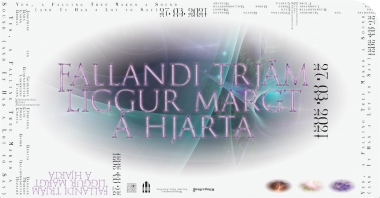 |
| |
 |
| Josephine van Schendel, Þórey Björk Halldórsdóttir, Bára Bjarnadóttir, Dýrfinna Benita Basalan, Tabita Rezaire, Brokat Films, Elín Margot, Tarek Lakhrissi |
| Fallandi trjám liggur margt á hjarta |
| 30. 03. 2021 - 09. 05. 2021 |
| |
Yes, a falling tree makes a sound. We were all in the forest when it fell and it had a lot to say. But we weren’t listening.
‘It matters what stories we tell to tell stories with … it matters what stories make worlds; what worlds make stories.’
Listen to the voices previously hidden in the crevasses and kept in the margins. Travel to utopian worlds fueled by love. Join a mutual understanding between humans and nature. Here, the power structures are reversed and interplanetary lifeforms visit to tell us about life on earth. All of it might seem otherworldly, but we do live in a strange reality.
Feminist science fiction is rewriting patriarchal master narratives, the stories that continue to make up our world. This practice challenges the hegemonic systems and gives voice to marginalised identities that are unable to thrive under the patriarchal rule. Feminist perspectives offer new ways of looking at power, gender, ecology and spirituality.
In the past year, the world has undergone many changes and proven that it is not unshakable. When we step out of quarantine, how do we want to restart society? We have been given the opportunity to listen.
Curated by Helena Aðalsteinsdóttir
|
| |
Brokat Films are the painter and self-proclaimed star, Sasa Lubińska (1990, Poland) and video artist Joanna Pawłowska (1990, Poland, lives in Reykjavík). Equipped with cameras, 3D programs and glitter, they give insight into cultures on other planets by producing travel vlogs, tutorials and life coaching sessions. Now they embark on a journey to earth in the search of the comfort zone and true artificial love.
Navigating digital, corporeal and ancestral memory, Tabita Rezaire (1989, France, lives in French-Guinia) questions the forgiveness narrative with text message apology on behalf of the western world. In an attempt to apologise for the colonial matrix power that is capitalism and white supremacy, the work asks who benefits from the apology and what power structures hide behind it.
Drawing shapes from the imaginary world of Goosebumps and memories of eating an insect infested chompoo fruit in childhood, Dýrfinna Benita Basalan (1992, Iceland/Philippines) tells a story of resilience and power. In the crevasses, the shadows and on the margins the spider awaits, symbolising femininity, patience, and re-creation.
Bára Bjarnadóttir (1991, Reykjavík) engages in a conversation with her mother and her plot of land. The trees are no longer passive listeners, but take part in the conversation as they mediate stories through the roots in the soil and the whistles in the wind. Mother and daughter, plants and microplastics play equal roles in this ecosystem that thrives in the imaginary.
Þórey Björk Halldórsdóttir (1982, Reykjavík) is an experience designer and brewer. A gleeful trickster who thrives on the elements of surprise, Þórey is interested in the act of sharing, joy and connectivity. With sudden changes in social contact, how can we share acts of intimacy? How can we high-five without touching or tongue twist a lover without sharing saliva?
Cheers!
In her AI infused installation, Josephine van Schendel (1996, The Netherlands, lives in Sweden), hellenistic sculptures of women are transformed into artificial trees and landscapes. Through deep learning processes, the classical art forms are decoupled from the iconographic semantics of the past and regenerated into digital abstract works. Tought poems by Brook Corfman and facts about the climate crisis, a robot tells an infinite story of a foraging hunter back in 2050.
Elín Margot (1995, France, lives in Reykjavík) is a food designer and artist who creates eating experiences that reflect on present social structures and explore alternative futures. Speculating about the future of human and more-than-human relationships within the context of cellular agriculture, Elín Margot considers interspecies relationships in our food system, blurring the borders between her own body and what it consumes.
Tarek Lakhrissi (1992, France, lives in Belgium) engages political and social issues around transformative narratives in language, magic, weirdness, codes and love. In this futuristic narrative, a threat from an alien invasion marks the end of capitalism and start of the realisation of feminist dreams. Hopefulness and melancholy greet as we hear the anthem for the new world.
|
| |

|
|
|
|
Grandagarđur 20 - 101 Reykjavík
kob@this.is |
|
